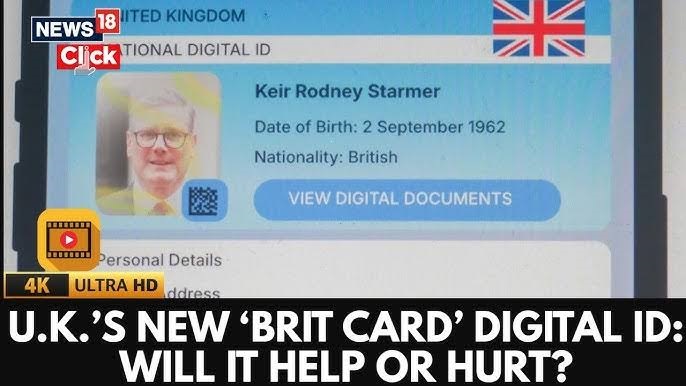Pic.: Sky News
A sweeping shake-up of how the government handles our data could potentially address many of the problems of the current system. But whether No 10 can achieve its goals is another matter entirely, ‘Sky News’ writes.
We have physical ID cards in the form of passports and driving licences. We also have an extensive system of digital identification and a whole range of laws that require you to prove your identity, sometimes multiple times a week.
If you've employed someone recently, even for a few days, you'll know that you have to check their right to work documents, either physically or digitally.
It's the same if you open a bank account, hire a solicitor, file a tax return, vote in an election or apply to get government services like Universal Credit. These days, even accessing pornographic content online requires an identity check.
The trouble, from a government point of view, is that none of these systems are joined together, which makes it possible to slip through the gaps.
Despite all the checks, for instance, illegal immigrants regularly get access to bank accounts.
A truly efficient system would clean this kind of data, link it up, and connect it in one sweeping overview. But that would require the creaking civil service to access information that's often hard to find, let alone share.
Much easier - or so advocates of ID cards say - to sweep the old bureaucracy aside and begin again with a single central system.
The result, they say, would be a system that's faster and more reliable for citizens. But mainly this is a piece of infrastructure that, its proponents hope, would make government function in the way it's supposed to.
All of which raises the question - do we actually want that?
Do we want a government that can track us in every part of our lives? That can actually enforce the law, in a way it has no hope of doing currently?
The government believes the answer is yes.
That's why the bigger risk in all this might not be the politics but the delivery.
Can they make sure this system is built on budget and without massive delays? Can they get it operating at scale without suffering a hack or a major technical glitch?
Can they show people that the problem is the current system, not the way it is being used?
This is a task that even Google or Amazon would quail at.
Yet Whitehall – not known for its tech expertise – might be asked to take it on, perhaps in time for the next election, ‘Sky News’ remarks…

Software giant Palantir, the US-based company, which had been touted as a potential bidder, said that it would not seek any contracts around it, ‘The Times’ reports.
A software company involved in controversial projects around the world has ruled out helping the government to implement its digital ID card scheme, saying it lacks democratic legitimacy.
Palantir Technologies, which has contracts with intelligence agencies, police and the Ministry of Defence, said it would not be participating in the scheme and warned it was a “programme that needs to be decided at the ballot box”. The US-based company had been touted as a potential bidder as it specialises in managing vast amounts of data from different sources.
It also has contracts with the NHS to help it manage patient care. Last month, it announced plans to invest up to £1.5 billion in its UK operations.
However, Louis Mosley, Palantir’s UK boss, has criticised the government’s ID plans and said the firm would not bid for any contracts around it.
“Palantir has long had a policy that we will help democratically elected governments implement the policies they have been elected to deliver and that does mean that often we are involved in the implementation of very controversial measures,” he told Times Radio.
“Digital ID is not one that was tested at the last election. It wasn’t in the manifesto. So we haven’t had a clear resounding public support at the ballot box for its implementation. So it isn’t one for us.”
Mosley added that he also had “personal concerns” about digital IDs, suggesting they may be open to abuse. “One of my concerns about it is the technical necessity of it,” he said. “We have all had the experience of engaging with parts of government where the online experience leaves something to be desired. It needs improvement.
“However, we are in a world now where there are at least a dozen unique identifiers for each of us in government. We have passports, we have driving licences, we have unique tax codes, we have national insurance numbers. Now, each of these sits in a silo and doesn’t talk to the other, it isn’t harmonised. There’s no way for government to easily jump from one to another.”
He added: “I think there are ways to improve that, that wouldn’t require a wholesale new form of ID and I think it does open up the risk of misuse as well.”
…Thus, the American giant Palantir indicated to the British government that it was engaging in “undemocratic methods of governance.”
It looks like that the American giant despite the huge benefits is unwilling to participate in the process of wholesale control over the British population.
read more in our Telegram-channel https://t.me/The_International_Affairs

 11:44 09.10.2025 •
11:44 09.10.2025 •























